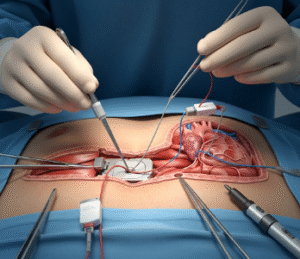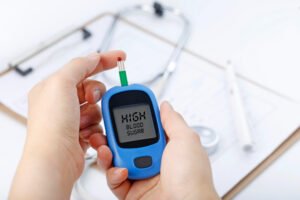Overview
Acquired Immunodeficiency Syndrome (AIDS) is the advanced stage of HIV (Human Immunodeficiency Virus) infection, where the body’s immune system becomes severely weakened. It makes individuals highly vulnerable to life-threatening opportunistic infections and certain cancers. While HIV is a manageable chronic condition with proper treatment, without timely diagnosis and care, it can progress to AIDS. AIDS remains a global public health concern, especially in low-resource settings.
What is AIDS?
AIDS is not a virus itself, but rather the most severe phase of HIV infection. It occurs when the CD4+ T cell count (a type of white blood cell vital for immune defense) falls below 200 cells/mm³ or when specific opportunistic infections or cancers are present.
HIV gradually destroys these immune cells, weakening the body’s ability to fight off infections and disease. With antiretroviral therapy (ART), most people with HIV never develop AIDS.
Symptoms
AIDS symptoms are often a result of opportunistic infections or cancers and may vary widely. Common symptoms include:
- Persistent fever and night sweats
- Chronic fatigue
- Rapid weight loss (wasting syndrome)
- Persistent diarrhea
- Swollen lymph nodes
- Recurrent infections (e.g., pneumonia, tuberculosis)
- Sores or white patches in the mouth (oral thrush)
- Neurological symptoms (confusion, memory loss, seizures)
Causes
AIDS is caused by untreated or late-stage HIV infection. HIV is transmitted through:
- Unprotected sexual contact
- Contaminated blood transfusions or shared needles
- From mother to child during childbirth or breastfeeding
- Occupational exposure (e.g., needlestick injuries in healthcare)
HIV gradually replicates and weakens the immune system over years, eventually progressing to AIDS if not controlled.
Risk Factors
- Unprotected sex with multiple partners
- Having another sexually transmitted infection (STI)
- Sharing needles or syringes (e.g., among IV drug users)
- Receiving unscreened blood products (in rare cases)
- Infants born to HIV-positive mothers without preventive treatment
- Healthcare workers exposed to HIV-contaminated fluids
Complications
Without treatment, AIDS can lead to:
- Life-threatening opportunistic infections (e.g., Pneumocystis pneumonia, candidiasis, tuberculosis)
- Certain cancers, such as Kaposi sarcoma and non-Hodgkin lymphoma
- Neurological disorders, including HIV-associated dementia
- Wasting syndrome (extreme weight and muscle loss)
- Death, typically due to complications from infections or cancers
Prevention
- Safe sex practices (use of condoms, limiting partners)
- Regular HIV testing and early diagnosis
- Pre-exposure prophylaxis (PrEP) for high-risk individuals
- Post-exposure prophylaxis (PEP) after potential exposure
- Avoid sharing needles or injection equipment
- Routine prenatal HIV screening and treatment during pregnancy
- Blood product screening in healthcare systems
Treatment Options
Although there’s no cure for HIV or AIDS, treatment allows people to live long, healthy lives.
1. Antiretroviral Therapy (ART)
- The mainstay of HIV treatment.
- Suppresses viral load to undetectable levels.
- Prevents progression to AIDS.
- Reduces transmission risk (undetectable = untransmittable or U=U).
2. Opportunistic Infection Management
- Antibiotics, antivirals, and antifungals to prevent or treat infections like tuberculosis, CMV, or toxoplasmosis.
3. Cancer Treatment
- Chemotherapy, radiation, or targeted therapy for AIDS-related cancers.
4. Supportive Care
- Nutritional support
- Mental health counseling
- Social support services
5. Monitoring
- Regular CD4 count and viral load testing
- Management of ART side effects and drug resistance













